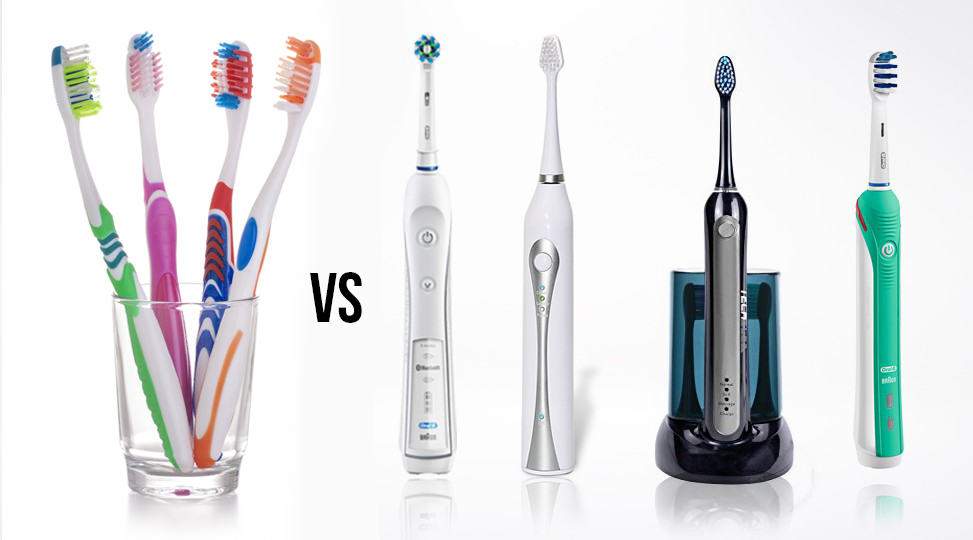
Whilst the importance of brushing twice daily is well understood, people often find themselves wondering whether a manual toothbrush or electric toothbrush will provide a better clean. Both are effective at removing plaque and helping to maintain optimal oral hygiene, but there are a few reasons why electric toothbrushes may be a better choice for some people.
Considerations
Dentists use and are happy to recommend manual toothbrushes to all patients, however some individuals can benefit from using an electric toothbrush. When used with the appropriate technique (motion, pressure) and skill to ensure adequate coverage of hard-to-reach areas, a manual toothbrush is very effective at cleaning the teeth.
Manual brushes are cheap to buy, easily portable and can be effective at cleaning your teeth if used correctly. You are more likely to be able to scrub and potentially over brush your teeth/gums with a manual brush. Sometimes the size of a manual brush can be too big to get to the harder to clean areas of your mouth. Dentists recommend that toothbrushes are replaced every 3 months.
Electric toothbrushes are more expensive to buy and need to be recharged on a regular basis to be effective. The oscillating head can cover a larger area, making the brushing process much easier and more efficient. Some studies have shown that compared to manual toothbrushes, electric toothbrushes can reduce plaque (bacteria) by up to 21 percent, and gingivitis (bleeding gums) by 11 percent. Having less plaque on your teeth will help reduce the risk of developing tooth decay. Those who are prone to brushing too hard with a manual toothbrush can also damage the enamel on their teeth, and this is less likely with an electric toothbrush.
At the upper end of the scale, you are likely to gain more features, such as variable brush head speeds, longer warranties, timers, travel cases and more. Timers and pressure sensors will help do a better job and prevent over brushing. The smaller head will make it easier to clean the harder to reach areas. Your teeth will feel cleaner having used an electric toothbrush. You should be aware that the brush heads will still need to be replaced every 3 months.
Due to their detailed cleaning, many professionals recommend electric toothbrushes for use on braces. When brushing braces with a sonic or oscillating electric toothbrush, ensure the bristles surround the brackets, but always be careful — undue pressure can damage the brackets. Be sure to slow down and brush each tooth individually, and your smile will stay sparkling.
You can clean your tongue with an electric toothbrush much the same as you would with a manual one. Many brushes will have a gum care or massage mode, if yours has a similar setting then it’s best to use it. Depending on the style of electric brush, you may find it more comfortable to brush with small concentric circles. Ensure you cover all of the tongue, and rinse afterwards.
If you don’t use your electric toothbrush correctly, you can cause harm to your gums. Being too rough with the brush can cause your gums to recede, opening up more area for bacteria to reach the bone below. It’s very important to be gentle. A sign that you’re not being delicate enough could be that you’re replacing your brush too often. If you’re find that you replace your toothbrush head more than once every three months, you likely need to ease up.
Making a Decision
Deciding between using a manual or electric toothbrush will ultimately come down to personal preference and experience. In summary, both standard and electric toothbrushes can be used just as effectively to keep your mouth clean and your teeth healthy. The key is to brush and floss every day, regardless of the kind of brush you prefer. However, those with dexterity challenges, children and those seeking an easier brushing experience may wish to consider investing in an electric toothbrush. An electric toothbrush can offer additional benefits such as more effective removal of plaque, a pressure sensor to prevent aggressive brushing, better grip, and additional features such as brush timers and smartphone apps to track your oral hygiene routine.
Both types of toothbrushes have their advantages but both types will get the job done as far as removing plaque, if used properly.









